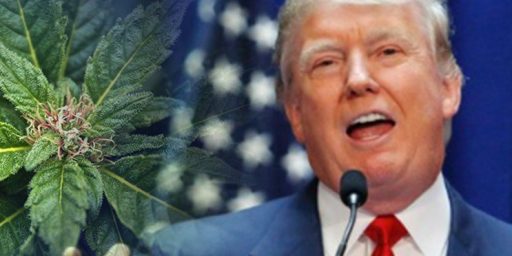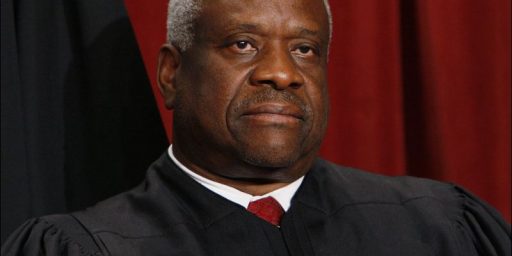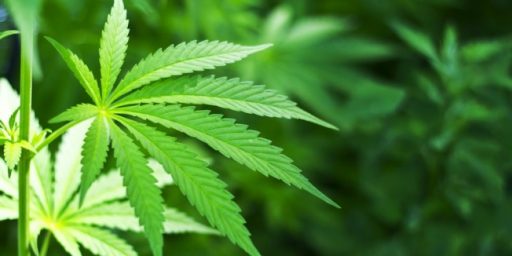Supreme Court Allows Prosecution of Medical Marijuana
The U.S. Supreme Court today upheld, by a 6-3 margin, the power of the federal government to regulate medical marijuana notwithstanding state laws permitting it.
Supreme Court allows prosecution of medical marijuana (CNN)
The U.S. Supreme Court Monday ruled doctors can be blocked from prescribing marijuana for patients suffering from pain caused by cancer or other serious illnesses. In a 6-3 vote, the justices ruled the Bush administration can block the backyard cultivation of pot for personal use, because such use has broader social and financial implications. “Congress’ power to regulate purely activities that are part of an economic ‘class of activities’ that have a substantial effect on interstate commerce is firmly established,” wrote Justice John Paul Stevens for the majority. Justices O’Connor, Rehnquist and Thomas dissented. The case took an unusually long time to be resolved, with oral arguments held in November.
The decision means that federal anti-drug laws trump state laws that allow the use of medical marijuana, said CNN Senior Legal Analyst Jeffrey Toobin. Ten states have such laws. “If medical marijuana advocates want to get their views successfully presented, they have to go to Congress; they can’t go to the states, because it’s really the federal government that’s in charge here,” Toobin said.
While I disagree with the public policy of the federal government here, the Supremes are correct that federal law trumps state law in an area where the feds have jurisdiction. It has been an article of faith for decades that the feds have the power to regulate medicine and drugs as an extension of their jurisdiction over interstate commerce.
Update: Larry Solum links the opinion and has an interesting set of excerpts and analysis.
One has to love the AP’s headline for this, “Court Rules Against Pot for Sick People.” The understanding of the press corps, let alone much of Congress, that the court is not in the business of deciding things like whether sick people should get marijuana is astounding.





I fail to see how what one does in the privacy of their own backyard has any “substantial effect on interstate commerce”.
“…because the garden patch weed would affect “overall production” of the weed, much of it imported across American borders by well-financed, often violent drug gangs.” First, is there any connection at all to medicinal marijuana users and commerce with violent criminals? Second, doesn’t increased production in the U.S., by simple principle of supply and demand, actually reduce the amount imported by violent criminals?
But as long as a middle-aged male can choose from three or four different types of boner-pills, while cancer patients suffer, well, I guess that’s o.k. (note sarcasm).
The flip side of this coin is how will Federal Government make local governments to enforce their law. Certainly they don’t have the resources to go after every personal-use grower. I suppose that renders this to be nothing more than political window dressing.
I hope the “interstate commerce” starts happening again.
I FIRMLY believe this Federal MJ ban could now be used to override ANY state right.
That is … for example… the right to collect state sales tax for intrastate traffic (e.g. Internet purchases)
Randy
The reasoning, I suppose, is that it would be hard for the government to differentiate between legitimate (i.e., medical) marijuana and that grown illegally. Therefore, non-medical marijuana users may be tempted to grow marijuana in their own yards, thus reducing demand for others’ marijuana, thus driving down marijuana prices, thus affecting marijuana sales — and some of those sales are bound to be interstate.
Quite a stretch, to say the least.
Guys, guys: read the op (or Scalia’s concurrence) & get back to us, okay?
Actually I believe your analysis is lacking here. The danger with this ruling is that it doesn’t address interstate commerce at all, but rather activities which are not even commercial at all. The court has just ruled that if a cancer patient grows their own pot, doesn’t sell it and jealously guards it from others, that they are still engaging in interstate commerce.
How, precisely, are they still engaging in interstate commerce? The federal government doesn’t have constitutional jurisdiction in such a medical case because in no way could the person be construed as having been involved in illicit interstate commerce. I think the AP’s headline is actually very appropriate since the court just arbitrarily expanded the federal government’s power and I don’t see why you’re lauding them upholding an existing and bad ruling.
The people most directly affect by this ruling is not the user, but rather, the doctor who prescribes the marijuana. The only thing the court ruling affect is the ability for any doctor who wants to be able to continually legally prescribe anything without loosing his license from DEA.